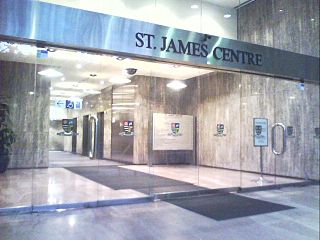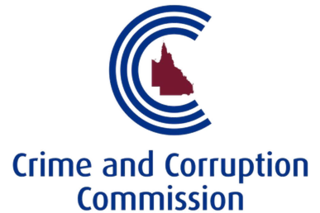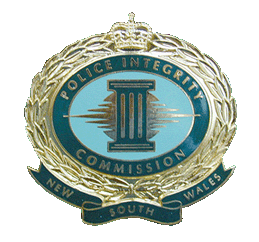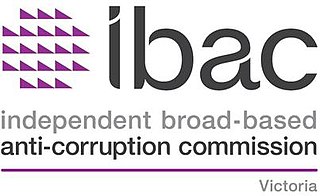
The Regulation of Investigatory Powers Act 2000 (c.23) is an Act of the Parliament of the United Kingdom, regulating the powers of public bodies to carry out surveillance and investigation, and covering the interception of communications. It was introduced by the Tony Blair Labour government ostensibly to take account of technological change such as the growth of the Internet and strong encryption.

The Western Australia Police Force, colloquially WAPOL, provides police services throughout the state of Western Australia, an area of 2.5 million square kilometres, the world's largest non-federated area of jurisdiction, with a population of 2.66 million, of which 2.11 million reside in the Perth Metropolitan Region.

The Independent Commission Against Corruption (ICAC) is an agency of the Government of New South Wales responsible for eliminating and investigating corrupt activities and enhancing the integrity of the state's public administration. The Commission was established in 1989, pursuant to the Independent Commission Against Corruption Act, 1988 (NSW), modeled after the ICAC in Hong Kong.

The Royal Commission into the New South Wales Police Service, also known as the Wood Royal Commission, was a royal commission held in the State of New South Wales, Australia between 1995 and 1997. The Royal Commissioner was Justice James Roland Wood. The terms of reference were to determine the existence and extent of corruption within the New South Wales Police; specifically, it sought to determine whether corruption and misconduct were "systemic and entrenched" within the service, and to advise on the process to address such a problem.
Ian Michael Macdonald is a former Australian politician and currently undergoing court proceedings and was a member of the New South Wales Legislative Council from 1988 to 2010 representing the Labor Party. Between 2003 and 2010, Macdonald held a range of ministerial responsibilities in the Carr, Iemma, Rees, and Keneally ministries. Macdonald, who joined the Labor Party in 1972, had his membership of the party terminated in 2013 for bringing the party into disrepute.
John James Mansell Bowler is a former Australian politician who was a member of the Western Australian Legislative Assembly from 2001 to 2013.
Andrew Mark Mallard was a British-born Australian who was wrongfully convicted of murder in 1995 and sentenced to life imprisonment. Almost 12 years later, after an appeal to the High Court of Australia, his conviction was quashed and a retrial ordered. However, the charges against him were dropped and Mallard was released. At the time, the Director of Public Prosecutions stated that Mallard remained the prime suspect and that if further evidence became available he could still be prosecuted. He was released from prison in 2006 after his conviction was quashed by the High Court, and paid $3.25 million compensation by the state government.
The Office of Police Integrity (OPI) was the Australian state of Victoria independent police oversight and anti-corruption agency established by the Victorian Government in November 2004. OPI ceased operation on 9 February 2013 and was replaced by the Independent Broad-based Anti-corruption Commission (IBAC). OPI's official role was to detect, investigate and prevent police corruption and serious misconduct and to ensure that police members had regard to the human rights set out in the Victorian Charter of Human Rights and Responsibilities.
Edward Moses Obeid is a retired Australian politician, and convicted criminal, who served as a member of the New South Wales Legislative Council between 1991 and 2011, representing the Labor Party. He was the Minister for Fisheries and the Minister for Mineral Resources from 1999–2003. Prior to the March 2015 expiry of his term in the Legislative Council, Obeid announced his decision to retire early on 10 May 2011, citing family reasons.

The Crime and Corruption Commission (CCC) is an independent Queensland Government entity created to combat and reduce the incidence of major crime and to continuously improve the integrity of, and to reduce the incidence of misconduct in, the Queensland public sector. Formerly the Crime and Misconduct Commission (CMC) 2002–2014. The CCC also has a witness protection function. The commission was established on 1 January 2002, when the former Criminal Justice Commission and the Queensland Crime Commission were merged into a single entity under the name Crime and Misconduct Commission.

The Police Integrity Commission, was a statutory corporation of the New South Wales Government, responsible for the prevention, detection, and investigation of alleged serious misconduct in the Police Force in the state of New South Wales, Australia. The mission of the commission was to be an effective agent in the reduction of serious police misconduct. On 1 July 2017, the Police Integrity Commission was abolished and replaced by the Law Enforcement Conduct Commission.
Shelley Frances Archer is a former Australian politician. She was a Labor Party member of the Western Australian Legislative Council from May 2005, representing the Mining and Pastoral electoral region. A former union official, she was one of several state MPs to become involved in the 2006–2007 Corruption and Crime Commission investigation into the dealings of former-Premier-turned-lobbyist Brian Burke. The partner of influential unionist Kevin Reynolds, she was associated with the conservative wing of the party.
John Robert Quigley is an Australian barrister, solicitor and politician in Western Australia. A member of the ALP, he has served as a member of the Western Australian Legislative Assembly from the 2001 election until the present, initially as the Member for Innaloo (2001–2005) until that seat's abolition in an electoral redistribution, then as the Member for Mindarie (2005-2013) until that seat's abolition in an electoral redistribution and is currently the Member for Butler. As of March 2022, he is the state's Attorney-General and Minister for Electoral Affairs in the second McGowan ministry after holding the position of Attorney General and Minister for Commerce in the McGowan Ministry.

John Biase D'Orazio was an Australian politician who served as the member for Ballajura in the Western Australian Legislative Assembly from 10 February 2001 to 6 September 2008. He was a minister in the governments of Geoff Gallop and Alan Carpenter, and a member of the Australian Labor Party until 29 August 2006, when he resigned following several controversies. Born to Italian immigrants, D'Orazio grew up on a market garden in the Perth suburb of Bayswater. He studied pharmacy at the Western Australian Institute of Technology, later opening his own pharmacy business. In 1981, he was elected to the Bayswater council, and in 1984, he became the mayor of Bayswater, in which position he served until 2001.

Corruption can take many forms, and can distort how public policy is made or implemented. This article discusses the responsibilities of the various agencies involved in combating corruption in Australia. While Australia is a wealthy democracy, over the decade since 2012, Australia's ranking in the Corruption Perceptions Index from Transparency International has slipped from 7th place in 2012 to 18th in 2022 on a scale where a more honest public sector receives a lower rank. Additionally, there is a public perception that corruption in Australia is increasing. All states have broad-based anti-corruption agencies, and legislation for a national anti-corruption commission has been proposed by the Commonwealth government.
Nick McKenzie is an Australian investigative journalist. He has won ten Walkley Awards, been twice named the Graham Perkin Australian Journalist of the Year and also received the Kennedy Award for Journalist of the Year in 2020 and 2022. He is the president of the Melbourne Press Club.

Thomas Richard Tate is a Laotian-born Australian businessman, property investor and politician who is the current mayor of the City of Gold Coast. He was first elected on 28 April 2012 and re-elected on both 19 March 2016 and 28 March 2020 with more than two thirds of the preferential vote.

The Independent Broad-based Anti-corruption Commission (IBAC) is Victoria's anti-corruption agency with jurisdiction over the public sector. It does this by:
Graham John Burkett was an Australian politician who served as a Labor Party member of the Legislative Assembly of Western Australia from 1983 to 1989, representing the seat of Scarborough.
Matthew Hughes is an Australian politician. He has been a Labor member of the Western Australian Legislative Assembly since the 2017 state election, representing Kalamunda.










